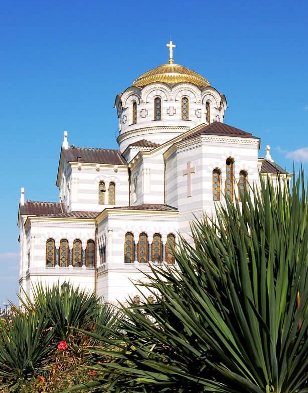Today, it is a biggest in Eastern Europe island of ancient and
medieval history on the territory of Sevastopol. The history of
Chersonesos started in the mid-6th C. BC, when this antique city-state
was founded by the Greek colonists on a rocky promontory between 2 bays,
succeeded in establishing its control over the formaly independent
similar city-states of north-western Tavrika Region ("Tauros" means "a bull"), such as Kerkinitida (on
the site of the present-day Evpetoria) and Kalos-Limen (settlement
Chernomorskoe). By the end of the 2nd cen. BC this area was lost to the
Scythians. From the mid 1st. cen. AD the city was under the protection of the Roman Empire, which was
manifested by sending there legionaries and a squadron to control the
key points on the coast. By the end of the 3rd cen., attacks of the
warlike Germans on the northern boundaries of the empire forced the
Roman garrisons out of the Crimea to the Danube.
But the
empire was not going to part with the significant outpost - she came
back, but under another guise. On the map of the world appeared the
first Christian state in 6th cen. AD - Byzantine, being, actually, the
Eastern Roman Empire. Even when in the mid-15th cen. nothing, but the
capital of Constantinopol, remained of the country, Byzantines kept on
proudly calling themselves Romans, though for a long time they had
spoken only Greek.
In the
renovated empire, Chersones-Cherson enjoyed a special status. It
retained an administrative system inherited from its antoque period:
city authorities were to be elected by its population, the city had its
own mint. Cherson was not only a military-political and trading
stronghold, but an ideological one, too. It was from here that
Christianity spread over the vast expances of Eastern Europe.
 The year
of 988 after the birth of Christ (anno Domini) opened a new epoch for
Ancient Russia by having Prince Vladimir from Kiev baptized. In the first
Christian temple in Kiev service was celebrated by clergy-man from Cherson of Tauris.
The year
of 988 after the birth of Christ (anno Domini) opened a new epoch for
Ancient Russia by having Prince Vladimir from Kiev baptized. In the first
Christian temple in Kiev service was celebrated by clergy-man from Cherson of Tauris. Chersones-Cherson was a long-living city: it had been existing for about
two millennia on end. Alas, cities, like people, have destinies of
their own: they are born, live a life and pass away. At the end of the
14th cen. the last church bells chimed mass for the dead city. It could
not withstand enemies` invasions and changes in the economical and
political life of the Black Sea basin. Killing for Cherson turned out a
shift of the trade routes to the eastern part of the peninsula, where
they were fully controlled by the Genoese who kept away any rivals from
the key trade routes between the civilizations of the west and the Far
East.
See more on http://www.chersonesos.org/
